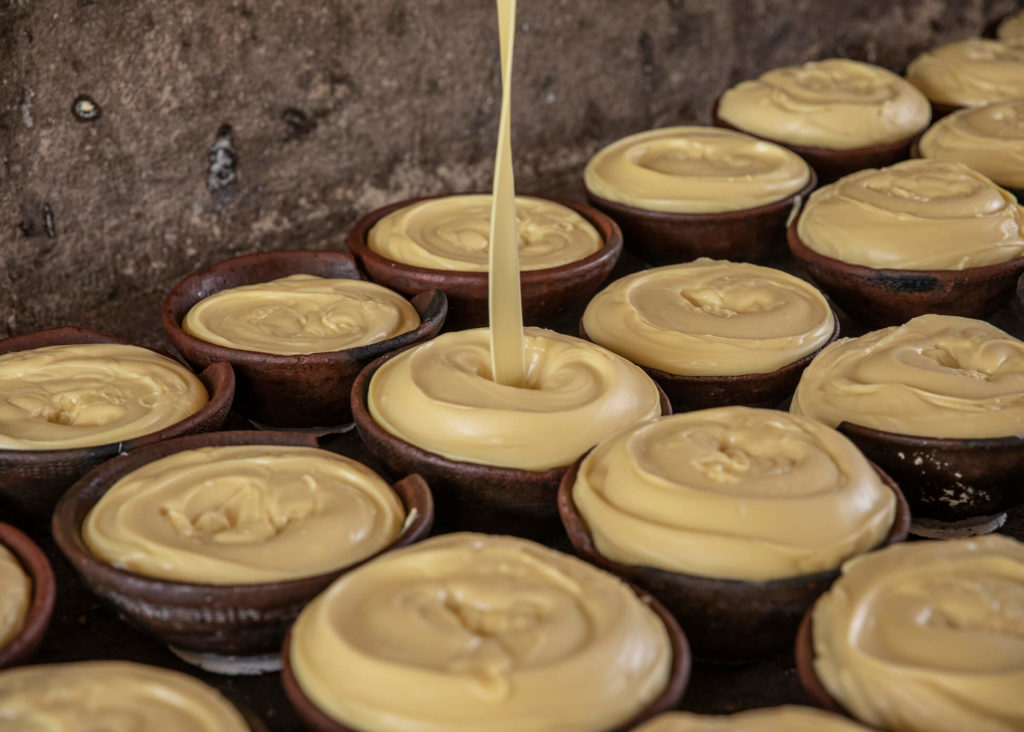Global Wellness Day, June 11, 2022
Fairtrade has launched a new strategy to significantly grow market opportunities for shea butter producers within the cosmetics sector, while at the same time diversifying its audience base to appeal to a younger, climate conscious demographic. The announcement comes ahead of Global Wellness Day, June 11, the annual global awareness day designed to encourage people to live well.
Grown across the African shea belt, in countries such as Cote d’Ivoire, Ghana, Nigeria and Kenya, shea butter features in core ranges across multiple products, from body care to hair care, skincare, moisturisers, body butters, lip balms, hand creams, shampoos and conditioners.
Fairtrade’s new business approach will initially focus on core ranges and corporate commitments, concentrating on leave-on products such as lotions to ensure volumes of shea butter sold on Fairtrade terms are higher and bring more benefits to producers. Marketing approaches will look to build partnerships with brands and retailers to help drive consumer exposure and demand for Fairtrade shea butter.
There are clear benefits to this market push for producers, not least additional Fairtrade Premium and improvements from meeting the Fairtrade Standards. We have a unique opportunity as Fairtrade to play a critical bridging role between producer needs and market demands, tell the story of long-term sourcing commitments and build connections within the supply chain for companies. This will see more producer groups benefit from Fairtrade sales.
The cosmetics industry is moving at pace to become more sustainable, and currently large numbers of certifications and seals operate in the sector. In this context, where consumer trust is critical, Fairtrade offers very high levels of trust, recognition and more.
ANNA BARKER, HEAD OF RESPONSIBLE BUSINESS AT THE FAIRTRADE FOUNDATION
Shea butter was selected as an important strategic focus for 2022-2023 due to its alignment with Fairtrade values: it is a crop that is heavily associated with women village societies across the African shea belt. It has the potential to build opportunities for female economic empowerment, which brands can champion among their audiences. Shea nut harvesting has the potential to be completely sustainable as the process involves wild collection or collection from trees inter-cropped with others near local villages.
The global shea butter market is predicted to reach $2.9 billion by 2025 (CBI Ministry of Foreign Affairs), with more than a quarter of total volumes imported to Europe. Yet, despite shea’s growing popularity, too little of the profits from this lucrative business reaches the ten million women who produce the nut butter. Producing shea butter is laborious and hazardous. After days spent sorting, crushing, roasting, grinding, cooking, whipping and separating shea butter by hand, shea butter producers often struggle to access a ready market for their product.
Fairtrade means producers organise themselves into co-operatives, and have the safety net of a Minimum Price which protects them from market price crashes, a Fairtrade Premium to spend on initiatives of their choice, as well as training and support in sustainable farming methods and climate adaptation. Tenidien Yeo is a member of the WOBIN Fairtrade Cooperative in Côte d’Ivoire. Her grandmother used to produce shea butter and now she does too. Yeo speaks about what forming a co-op has meant to her.
We became a real family; the cooperative is very beneficial for us. That is why we’re here to work, we’re all sisters thanks to WOBIN.
Tenidien Yeo
We used to work individually at home and this way of working was exhausting. So that’s why we decided to get together and help each other here.
KOUNDIANA COULIBALY, ANOTHER MEMBER OF WOBIN
Searches for ‘natural ingredients make-up’ were up 180% YoY in 2021[i]. In Euromonitor’s Voice of the Industry Sustainability Survey, almost 60% of beauty and personal care companies said they would give priority to health, social and environmental issues in the future. Fairtrade has an important role to play in this space. Latest Kantar figures show that Fairtrade is a particularly trusted and visible label, with 91% visibility, 79% trust and around a quarter saying they actively choose Fairtrade always and often.
To meet market demand for shea butter from new business partners, Fairtrade is also working hard to grow market supply. A special partnership with CAMFED, the Campaign for Female Education is supporting approximately 700 more shea butter producers in Ghana to meet Fairtrade standards and potentially unlock education opportunities for thousands of children over the next 10 years, via support from The Waterloo Foundation. Separately, a new partnership with WOBIN will see producers from Korhogo in Cote d’Ivoire sell their butter on Fairtrade terms.
Meanwhile, Fairtrade’s spotlight on shea butter will be complemented by parallel pushes on coconut oil/cream, cocoa butter and olive oil.
For more information about the business benefits of sourcing Fairtrade nuts and other cosmetics ingredients, attend Fairtrade’s next Fair Focus webinar taking place on 16th June. To register for the webinar, visit Eventbrite.
-ENDS–
For more information, interviews or images, contact martine.parry@fairtrade.org.uk Tel: 07886 301486
Notes to Editors
- Currently there are nearly 150 Fairtrade beauty products stocked on the high street and in supermarkets, as well as online and on Amazon. These range from body butter to dental care, incorporating ingredients grown by small-scale farmers in over 50 countries – including Burkina Faso, Cote D’Ivoire and Ghana – who produce ingredients such as coconut, argan, apricot nut oils and cocoa butter, shea or olive oil for beauty products. When shoppers choose Fairtrade beauty products, producers get a fair price and support to invest in community projects, from clean drinking water to improving their local healthcare.
- Fairtrade’s Fairtrade Sourced Ingredient (FSI) certification model gives companies greater flexibility to incorporate Fairtrade ingredients such as coconut, cocoa, olive oil and shea into their product ranges. The model uses a separate label to indicate that one ingredient is Fairtrade certified.
[i] https://www.youtube.com/watch?v=2z8zFCB_0Qc&t=2s (14/9/2021)
